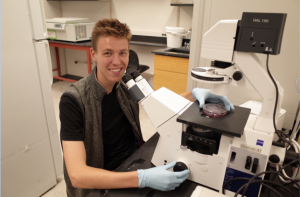Mentor: Shu-Bing Qian
Education:
Syracuse University – B.S. in Biology & Nutrition Science, August 2013 – May 2016
Awards and Honors
- NSF Graduate Research Fellowship – Honorable Mention 2017
- Syracuse University – University Scholar 2016 (highest academic honor)
- Syracuse University – Falk Scholar 2016
- Syracuse University – Biology Senior Research Award 2016
- Syracuse University – Biology Senior Academic Achievement Award 2016
- Syracuse University – Jim & Julie Boeheim Foundation Award 2015
- Syracuse University – Student Affairs Research Award 2015
- Syracuse University – Honors Crown Wise Award/Grant 2015
- Rochester Academy of Science Student Grant 2015
- Syracuse University – Ruth Meyer Research Scholar 2014
Research Experience:
- Department of Biology, Syracuse University – Dr. Mark Ritchie | August 2013 – May 2016
Examining enzyme/substrate kinetics in E.coli lactose metabolism during varying conditions to determine the role of the thermodynamic hypothesis. Experimental responsibilities included: hydrolysis assays, spectrophotometry, Western Blotting, and mathematical modeling for Mechaelis-Menton equations. - Cornell Biological Field Station, Oneida Lake – Dr. Margaret Voss | May 2015 – September 2015
Deciphering the influence of constant ambient light on avian neonatal metabolism. Experimental responsibilities included: collecting measurements of bird morphology & blood samples, analyzing glucose & A1C levels from blood samples, and running charcoal aeration on avian eggs for gas chromatography-mass spectrophotometry to identify metabolite changes.
Current Research Activities:
Cells rely on selective regulation of gene expression as a form of protection from adverse conditions. In response to the shortage of amino acids, cells rapidly activate a pathway called amino acid response (AAR) that is essential for cell survival. AAR triggers the translation of activating transcription factor 4 (ATF4) via an alternative initiation mechanism. ATF4 regulates the expression of several amino acid biosynthetic genes as well as their transporters to ensure intracellular metabolic homeostasis. The traditional view of AAR is based on full amino acid starvation, but very little is known about the cellular response to individual amino acid deprivation. We are investigating individual amino acid regulatory mechanisms that alter ribosomes and initiation factors in response to deprivation.

